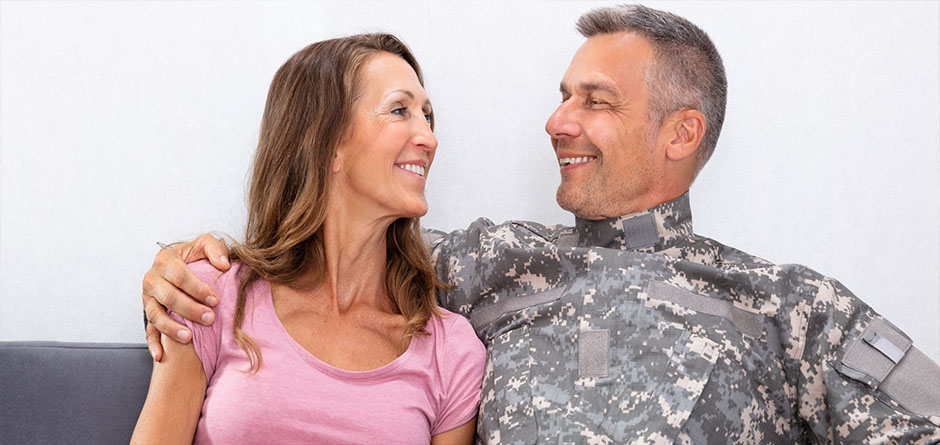According to a 2019 report from the U.S. Department of Labor’s Bureau of Labor Statistics, some 4.7 million military veterans had a service-connected disability. For veterans living with severe disability who wish to remain at home, often it is spouses and other family members who bear the brunt of 24/7 caregiving responsibilities.
Caregiving is hard work
“Think about how hard it is to be a spouse and a caregiver and never have time off, and the ongoing stress that would put on a person’s psyche and on their relationship,” says Jarrod DePriest, President of Maxim Healthcare Services. “Unfortunately, we see this all the time.”
Serving as a full-time caregiver to a loved one who requires 24/7 care can be mentally, physically, and emotionally exhausting. Often, a spouse or family member is expending so much time and energy tending to their disabled veteran’s physical care needs that they have little energy left to provide nurturing loving care. But loving care is just as important to one’s happiness and wellbeing.
Home care is available to veterans
What many military families don’t know is that veteran home healthcare options do exist and are available. In this article, we provide a list of options available to veterans and their families for veteran home care, and how you can get home healthcare for your veteran.
“When we find the right caregiver for a veteran, it changes everything,” says DePriest.
If you or someone you know is caring for a veteran, here are some things to know about how to take advantage of home health services.
1. You have options: Private duty nursing, respite, homemaker and home health aide services
There are several different types of home healthcare services, but military families often benefit from the following care options:
- Private duty nursing (also known as “Expanded Care”) provides hourly skilled nursing care for up to 24 hours a day for patients with complex healthcare needs such as feeding tubes, tracheostomies, ventilators and IVs.
- Homemakers and home health aides help elderly or disabled veterans take care of themselves and manage their daily activities, allowing them to remain at home for as long as possible. Home health aides assist with activities of daily living such as eating, getting dressed, grooming and bathing, as well as light housekeeping, laundering, and grocery shopping, under the supervision of a Registered Nurse.
- Respite care is short-term care that provides temporary rest for primary caregivers, often for eight hours at a time.
2) You can maintain an integral role in your veteran’s care.
Some family members may be wary of introducing a home healthcare clinician into the home for fear of changing the existing dynamics. Rest assured, home healthcare workers can partner with you to care for your veteran.
Take Kallista Scott, RN, for example. Scott is a private duty nurse with Maxim who has experience caring for a veteran with ALS, or Lou Gehrig’s disease. She works closely with the veteran’s spouse.
“My patient’s wife is very present in her husband’s care, as she was his main caregiver for many years,” says Scott. “She is his biggest advocate and is very familiar with what he wants and needs throughout the day. It’s been beneficial for both of us to have someone with a different perspective to bounce ideas off of and brainstorm with when we meet challenges.”
3) Getting home healthcare doesn’t only benefit your veteran, it’s also for your own wellbeing.
When you aren’t the primary, or the only, caregiver for your veteran, you’ll have more time and freedom to take care of yourself.
“With home healthcare, that family member who is the primary caregiver can feel free to do something as simple as go on a walk,” says DePriest. “They don’t have to wake up at 3 am to change bed linens. For that spouse or family member to not be the only person responsible for care is a huge game-changer.”
For many spouses, getting home healthcare means you can feel more refreshed and renewed when you do take on those caregiver responsibilities. “It enables family members to step back for a moment and take care of themselves,” says Scott. “Taking time to care for themselves is key to being able to come back rested, emotionally and physically, and continue taking care of their veteran.”
4) Home healthcare goes beyond improving physical health, it can improve mental and relational health in the home as well.
“Military spouses are often the primary, and only, caregiver available to a veteran who needs 24/7 care,” says Zach Wimberly, business development manager at Maxim. “The biggest impact to these families who we get to help is we are able to come in and change the dynamic of ‘the veteran is the patient, and the spouse is the caregiver.’ We can flip that on its head and allow spouses to get back to more of a spouse-to-spouse dynamic, so that the patient-caregiver dynamic doesn’t get in the way of their relationship.”
Most importantly, when considering home healthcare, know the benefits available to you as a military family. “Help is available, you just have to ask,” says Wimberly. “I see so many families who are shocked at the care that is actually available to them. At Maxim, we get veterans care in their own home – care that doesn’t demand even more from their family members.”
Veterans, military spouses and family members: You served us, now let us serve you. Learn more about home healthcare for military veterans.



